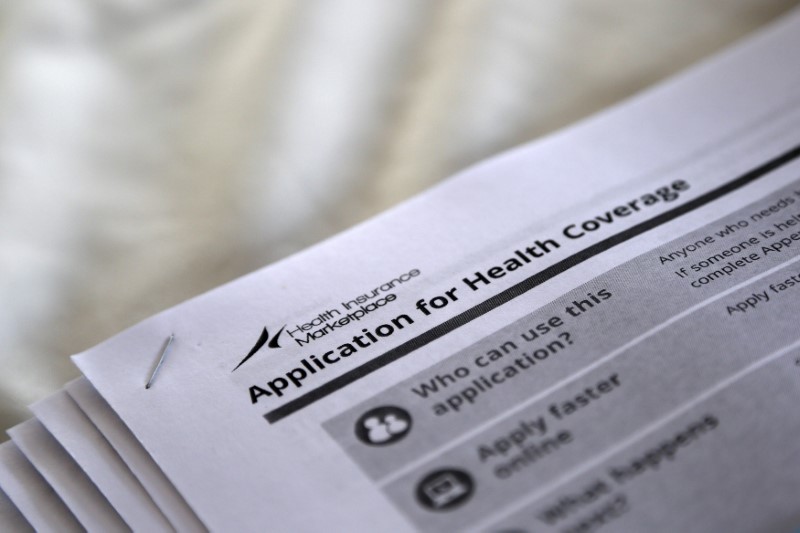By Caroline Humer and Yasmeen Abutaleb
NEW YORK/WASHINGTON (Reuters) - The Trump administration on Wednesday proposed changes to the Obamacare individual insurance market that insurers welcomed as a good start but that raised the possibility of higher out-of-pocket cost for consumers.
President Donald Trump and congressional Republicans have promised to scrap the 2010 healthcare law that is a key legacy of Democrat Barack Obama's presidency. But they are struggling to agree on a replacement for the law, which extended health insurance to 20 million Americans.
The proposed new rule, issued by a division of the U.S. Department of Health and Human Services, sets out changes that are meant to shore up the system developed by Obama, and comes after Humana Inc (N:HUM) on Tuesday said it would pull out of this market in 2018. It is unclear which elements of Obamacare could survive in the Republicans' replacement.
The rule does not address changes that must be made by law, such as for Obamacare's income-based subsidies.
The changes would tighten enrollment processes and allow insurers to collect unpaid premium payments, making it tougher for people to move in and out of insurance plans. Insurers say "gaming the system" has created an unprofitable mix of healthy and sick customers.
The Affordable Care Act aimed to chip away at soaring healthcare spending, but data shows costs are still rising. The U.S. government reported separately on Wednesday that total U.S. medical spending in 2017 is estimated to rise 5.4 percent to $3.36 trillion after a 4.8 percent spending uptick in 2016.
The administration on Wednesday also backed off implementing tougher oversight of the individual mandate, the requirement for all Americans to have health insurance or pay a fine, that was due to go into effect for 2016 taxes.
The U.S. Internal Revenue Service said as a result of Trump's executive order to reduce regulatory burden, it will not reject tax filings for the year 2016 that fail to indicate whether they had health coverage or paid the penalty set under Obamacare. This is a return to the policy for 2015 taxes, the IRS said.
The mandate was supposed to bring in healthy customers but Republicans have vowed to overturn it and insurers say it has not worked.
Aetna (N:AET) CEO Mark Bertolini on Wednesday said during a Wall Street Journal forum that the Obamacare exchanges had entered a "death spiral" in which rising premiums pushed out the healthiest customers, which in turn raises rates.
Aetna cut back offering new plans for 2017 and it and Anthem Inc. (N:ANTM) have said that without changes, they might not take part after this year.
Bertolini said in a statement that new Health Secretary Tom Price and the Trump administration have "taken some good initial steps with the proposed regulation." The top two industry groups, America's Health Insurance Plans and Blue Cross Blue Shield Association, echoed that view.
Shares of insurers were mixed in the early afternoon on Wednesday with Aetna gaining 1 percent to $127.01, Cigna (NYSE:CI) off less than 1 percent at $146.07 and Humana off 0.3 percent to $205.34. Anthem fell less than 1 percent to $162.90.
TOUGHER TO ENROLL
The Centers for Medicare & Medicaid Services, which are part of the Department of Health and Human Services, on Wednesday proposed the new rule that includes verifying the status of enrollees outside of the usual enrollment period.
It also proposes insurers can collect unpaid premiums from members when they sign up with the same issuer again, an incentive for people to always have insurance.
In addition, it proposed lowering the amount of guaranteed coverage for some "silver" level plans in the program, which it said could raise out-of-pocket spending and cut premiums.
It would give the states oversight of doctor and hospital networks included in the plans, reflecting a Republican theme that healthcare oversight be reduced at the federal level.
The rule proposes shortening the open enrollment period for the individual market to Nov. 1 through Dec. 15, similar to employer-sponsored insurance market and Medicare.
The weakening of the mandate and the new CMS rule making it tougher for people to sign up would have contradictory effects on premium pricing, according to Jonathan Gruber, professor of economics at MIT and one of the architects of the Affordable Care Act.
"You’re basically saying on the one hand, we have to weaken the mandate for political reasons but we have to lower prices, so we have to kick people out of the exchanges," Gruber said.
Patient advocate Families USA said the new rules would discourage younger, healthier people from enrolling, reduce financial assistance for families and make it harder for them to find networks that include their doctors.
Republican lawmakers, who are working on an Obamacare replacement, said the rule was a start.
"If we don’t take more steps like that, having an Obamacare subsidy will be like having a bus ticket in a town where no buses run, because there will be zero choices to buy,” Senator Lamar Alexander, chairman of the Senate health committee, told reporters outside the Senate.
Wall Street said the proposed changes could help insurer profitability but it was not clear by how much.

“As one would expect tightening special enrollment periods, shortening the open enrollment period to six weeks and mandating payment of premiums before coverage should lead to an improvement in the risk pool," Leerink Partners analyst Ana Gupte said.